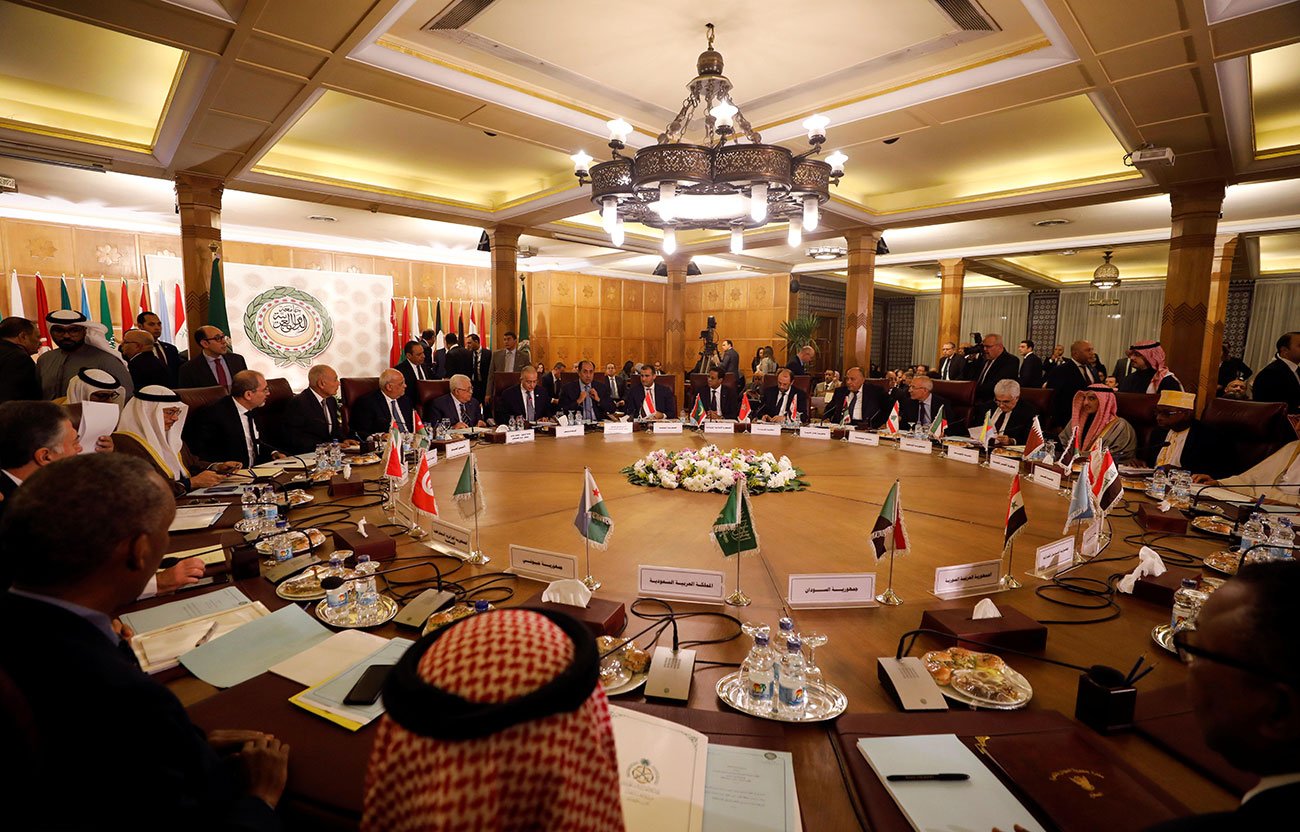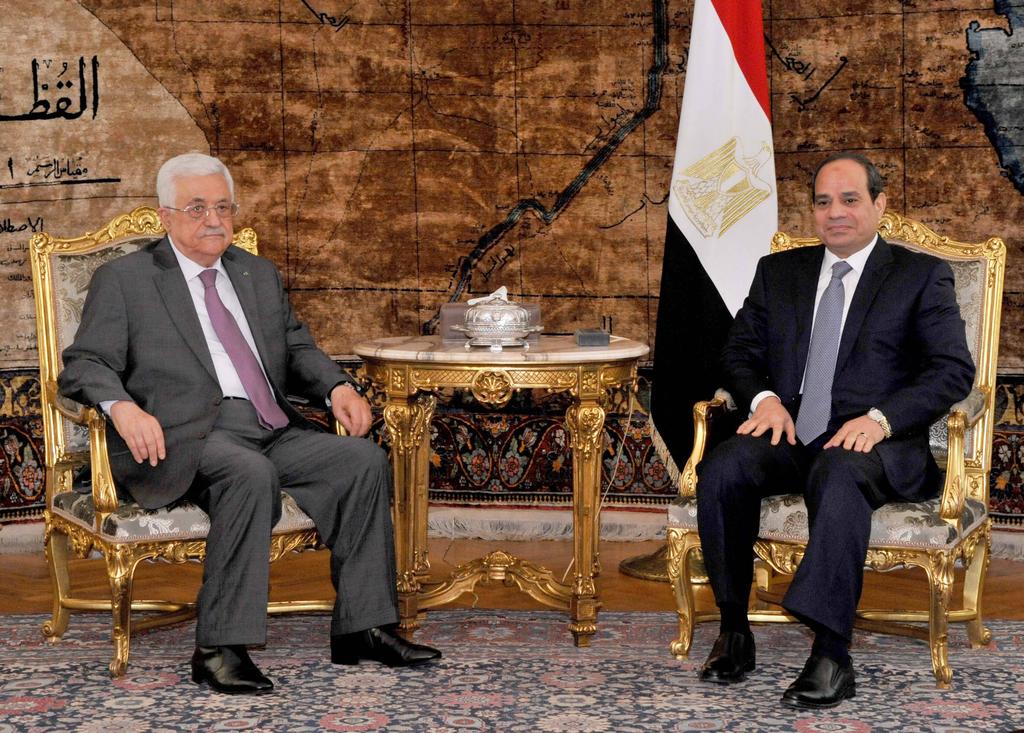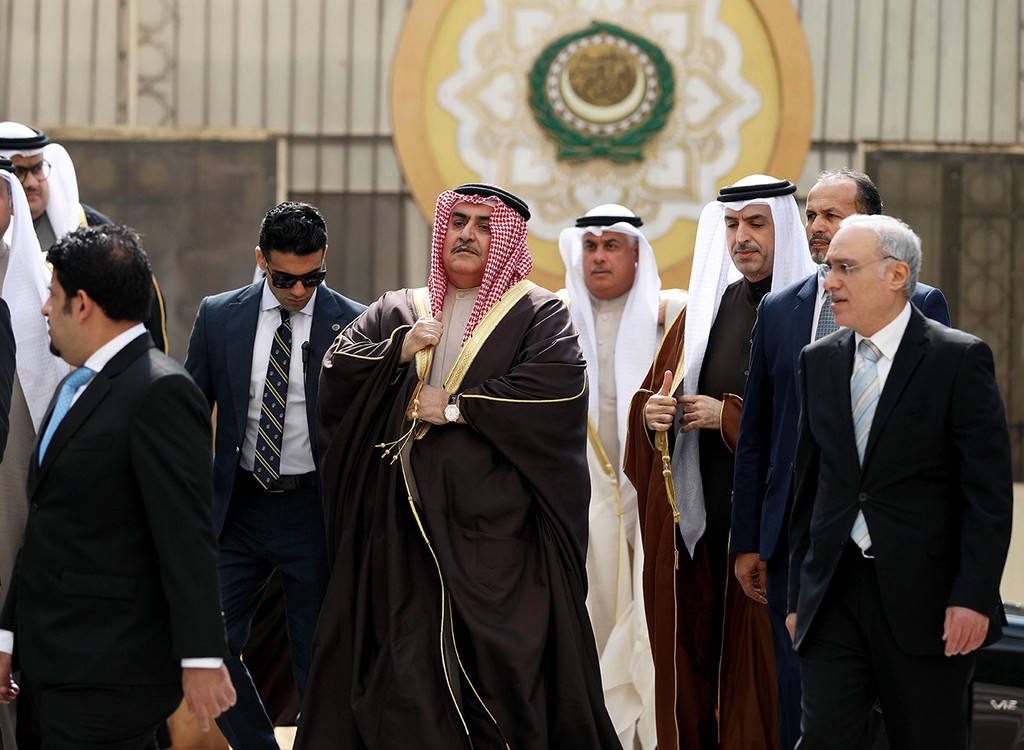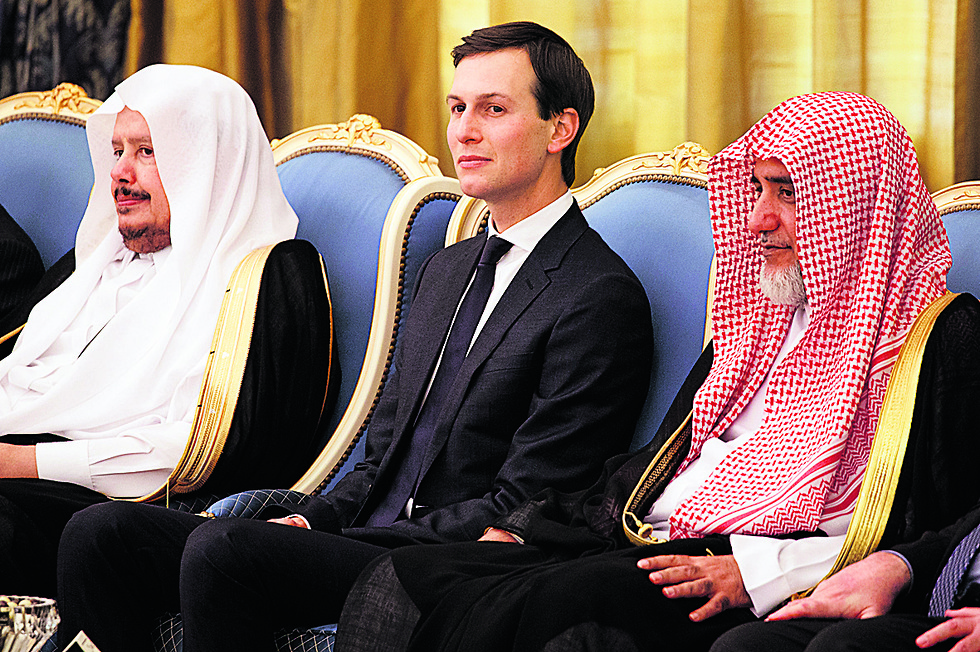The Arab League has rejected the “Vision for Peace” in the Middle East unveiled at the White House on January 28 by U.S. President Donald Trump in the presence of Prime Minister Benjamin Netanyahu.
“The so-called ‘deal’ does not constitute an appropriate ground to achieve a just, comprehensive or permanent peace based on the pertinent international resolutions and law,” declared the 22-member League at the end of an emergency session on Saturday in Cairo.
4 View gallery


Arab League foreign ministers gather in Cairo to discuss the Trump peace plan
(Photo: Reuters)
“On the contrary, this is, in fact, a setback to peace efforts exerted throughout the past three decades.”
Palestinian President Mahmoud Abbas, addressing the meeting, said: “We’ve informed the Israeli side… that there will be no relations at all with them and the United States, including security ties.”
This reflects the PA’s total rejection of the plan, with Abbas telling participants that he refused to discuss the plan with President Trump or even accept a copy for study.
“Trump asked that I speak to him by phone, but I said no,” the PA leader stated, “and that he wants to send me a letter… but I refused it.”
Despite the unanimity of the Arab League decision, envoys representing three Arab states – Bahrain, Oman, and the United Arab Emirates – were present at the White House for the roll out of the plan.
The proposal, which President Trump informally termed the “Deal of the Century,” calls for a diminished Palestinian territorial footprint in the West Bank compared to previous plans offered in negotiations with former prime ministers Ehud Barak and Ehud Olmert, and the possibility of a demilitarized state there and in the Gaza Strip, with its capital in Palestinian suburbs of Jerusalem.
It accommodates the Israeli annexation of all settlements – many of them on land contiguous with the pre-1967 Green Line, but also 15 “Israeli enclave communities” deep inside the West Bank. It also makes room for Israel’s formal annexation of the Jordan Valley, which comprises more than a quarter of the West Bank, with Israel’s army retaining military control.
It also sets out shared prayer access with Jews at the Al-Aqsa/Temple Mount compound in Jerusalem’s Old City, and pockets of Palestinian industrial zones in the Negev Desert.
When the plan was unveiled, Egypt expressed “appreciation” for the initiative, asking “relevant parties to undertake a careful and thorough consideration” of the proposal and calling for “dialogue, under US auspices, for the resumption of negotiations.”
Later, however, Cairo reconsidered, the weight of pan-Arab nationalist and Islamic religious objections leading it to join the other members of the Arab League in rejecting the plan.
Addressing the emergency meeting, Egyptian Foreign Minister Sameh Shoukry reaffirmed long-held Arab positions, including demands for an independent Palestinian state with East Jerusalem as its capital.
4 View gallery


Palestinian President Mahmoud Abbas meeting with Egyptian leader el-Sisi in Cairo
(Photo: AFP)
Shoukry warned that “disastrous consequences” awaited the region unless there were immediate international efforts to establish Palestinian sovereignty in lands now patrolled by the Israeli army and settled by its civilians.
“The alternative to an internationally guided effort opens the door to the advocates of terrorism and extremism who deploy despair and frustration in the hearts of the Palestinian and Arab people,” he said.
Less than a week ago, his ministry “thanked” the U.S. administration for leading an earnest peace effort.
“The difference between Tuesday and Saturday is perfectly understandable,” says Ramy Zohdy, a Cairo businessman and foreign relations secretary of the Egyptian Freedom Party.
“The Foreign Ministry considers it a ‘start’ because we are always with every solution that contributes to supporting peace and security in the region,” he continued. “At the same time, everyone agrees there is a lack of fairness or seriousness from the American side. And many believe that the plan is more related to the American elections and the political situation inside Israel.”
As much as Egyptians wish to oblige the Trump administration, they believe they are bound to advance Palestinian interests within the confines of an international consensus on how to resolve the conflict.
The Trump proposal is a “sharp turn” from longstanding U.S. positions, Arab League Secretary-General Ahmed Aboul Gheit said. “This turn does not help achieve peace and a just solution.”
Analysts say that the Arab League had little choice but to reject the Trump Administration’s “vision” as it embraces the maximalist stance of the Netanyahu government on the core issues, including the status of Jerusalem, Palestinian borders, and Jewish settlements in the West Bank.
Additionally, they characterize the plan as a “setup,” putting both the Arab states and the Palestinians in a Catch-22 situation.
“It’s not a ‘Deal of the Century.’ It’s a fait accompli demanding acceptance of more Israeli land annexation,” says Mohamed Gomaa, a researcher specializing in Palestinian affairs at the Al Ahram Center, a Cairo think tank close to the administration of President Abdel Fattah el-Sisi.
“Netanyahu went to Trump as part of an electoral tactic, fully expecting the Palestinians to refuse so he [the Israeli leader] can take unilateral steps,” Gomaa said. “This is why Egypt believes the Palestinian ‘no’ will be very harmful, even if we completely understand it.”
4 View gallery


Bahraini Foreign Minister Khalid bin Ahmed Al Khalifa at the Arab League summit in Cairo over the weekend
(Photo: EPA)
Egypt is also frustrated by a lack of progress in Hamas-Fatah reconciliation talks, which Cairo believes cripples pan-Arab efforts to advance statehood for the Palestinians.
“Hamas prioritizes arrangements with Israel over Gaza rather than making a concession to the [West Bank-based Palestinian] Authority, fully aware that they are impeding the essential interests of their people,” Gomaa said of the Islamist group’s leaders.
He added that the Arab League must navigate divergent approaches among members while being mindful of continued convergence over securing a viable Palestinian state.
“Honestly, some states are less interested in this issue, and they are okay with dropping it on the plate of the international powers. Others like to make bold speeches and trade on the Palestinian cause to advance their side in internal Arab divisions,” he explained.
“Egypt is part of a group that sees there is no time anymore for the luxurious game of who champions Palestine the most,” he went on. “We need to see these matters addressed soon because the delay will affect us internally to one degree or another.”
Gomaa’s views are reflected in comments by United Arab Emirates Minister of State for Foreign Affairs Anwar Gargash.
“What is being offered is a point of departure. This does not necessarily mean accepting it,” Gargash tweeted on Saturday. “Politics remains the art of the possible. Arab support and belief in the justice of the Palestinian cause are positive assets that can be relied on and should not be squandered. But that is not enough to change the balance of influence and power.”
The UAE’s ambassador to the U.S., Yousef al-Otaiba – who attended the peace plan’s roll out at the White House – said in a statement that it “offers an important starting point for a return to negotiations” within a framework led by Washington.
“The only way to guarantee a lasting solution,” Otaiba said, “is to reach an agreement between all concerned parties” with “the support of the international community.”
Kuwait’s Foreign Ministry released a statement last Wednesday saying that the country “highly appreciates” U.S. efforts to end the conflict, and that it remains committed to an independent Palestinian state based on the pre-1967 borders.
Likewise, Morocco’s Foreign Ministry said in a statement issued the same day that it “appreciates” the U.S. plan although “acceptance by the parties” remains “fundamental to the implementation and sustainability of the plan.”
On the day of the roll out, Jordan expressed the longstanding Arab view that Israel must withdraw from the territory it has occupied since the Six-Day War of 1967, and warned against the “annexation of Palestinian lands.”
Foreign Minister Ayman Safadi said Amman would continue to work for “a just and lasting peace that meets all the legitimate rights of the Palestinian people.”
On Saturday in Cairo, he warned of the “catastrophic ramification” of possible Israeli moves to implement the plan unilaterally, and referred to the “destructive consequences” of any attempt to change the status quo at Jerusalem’s holy sites.
Jordanian political analyst and former lawmaker Bassam Manasser says: “Jordan is the only Arab country that declared its rejection from the start, and has stayed with it until now – which will cost the kingdom heavily in terms of politics and economics.”
Saudi Arabia’s state news agency reported last week that King Salman had called Abbas to reassure him of Riyadh’s support for Palestinian rights. An editorial in the government-controlled Al Arabiya newspaper urged the Palestinian leadership to enter direct negotiations with Israel even without accepting the plan.
In a tweet, the kingdom’s Foreign Ministry said it “appreciates the efforts of President Trump’s administration to develop a comprehensive peace plan between the Palestinian and the Israeli sides, and encourages the start of direct peace negotiations between the Palestinian and Israeli sides under the auspices of the United States.”
Sulaiman al-Oquli, a Saudi political analyst and member of the board of the Saudi Society for Political Science, told The Media Line that the kingdom remained committed to the 2002 Arab Peace Initiative endorsed by the Arab League in 2002, “which stipulates the principle of land for peace and the establishment of a Palestinian state with Jerusalem as its capital.”
Nabil Shaath, an Abbas adviser, said on Saturday: “Obviously, there was American pressure on everyone prior to the Arab League’s clear decision, but today, no one has failed to reject the so-called deal.”
Abbas will now travel to Saudi Arabia for a meeting of the Organization of Islamic Cooperation, whose 57 members are also expected to dismiss the plan. After that, he will attempt to garner further support at meetings of the Non-Aligned Movement and the African Union.
Finally, he plans to take the Palestinian case to the UN Security Council.
Article written by Maya Margit and reprinted with permission from The Media Line. Dima Abumaria contributed to this report


